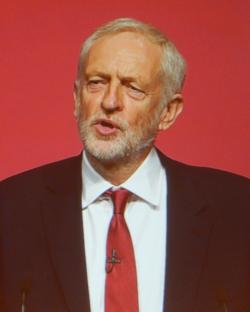By Mark Langabeer, Newton Abbot Labour Party
In my opinion, in the first head-to-head TV debate with Johnson on ITV, Corbyn was the victor. However, he did ignore the question of whether he would back his own deal or remaining in the EU. He could have used the analogy of union negotiators deciding what to recommend prior to talks with management. A recommendations can only be given after talks with management have taken place. Labour is planning hold a special conference after re-negotiating, to decide whether to support a deal or campaign to remain a member of the EU. It could decide to make no recommendation.
In the campaign around the 1975 referendum, the Labour Prime Minister, Harold Wilson, took no public position personally. On that occasion, generally the trade unions and the Labour left opposed membership of the Common Market, as the EU was called then. The Tories and Labour’s right-wing backed continued membership. The Marxists in the Labour Movement backed the No campaign, giving it only critical support because they rejected many of the No campaigns arguments. The main slogan of the Marxists was ‘No to the Common Market, Yes to a United Socialist States of Europe’.
There was also a right-wing opposition to the common market in 1975, from the Powellite (right) wing of the Tories. Powell had left or been expelled by the Tories and joined the Ulster Unionists by then. They were a relatively small force. In effect, the Tories today have gone over to most of Enoch Powell’s position on the EU, ie an English nationalist one.
Second TV debate
Labour, should it win the election, would negotiate what has been described as a soft Brexit. Although this would be less damaging to workers than a Tory Brexit, it would still have some effect on economic growth and workers’ living standards. Therefore, in my view, the Marxists should support a critical remain position at the special conference. It should be critical support, for the same reasons as we had critical opposition in ‘75.The EU bosses have no more interest than British bosses, when it comes to the welfare of working people.
In the second debate, the special Question Time programme, Corbyn showed that he is growing in stature. This time, he didn’t just ignore the question of his position on any Brexit deal negotiated by Labour, but said that he would be neutral in any referendum. I thought he defended Labour’s Programme well and his final summing up was more about addressing the nation. He was helped by some good contributions from the audience.
Sturgeon’s contribution was mainly focused on a second Scottish independence referendum, Indy-2, and Brexit. She made a comment which nobody picked up on, saying that Corbyn wouldn’t be the leader that she would choose. The question I would ask is, who would be her choice? Corbyn stated that Indy-2 was not a priority and not likely in the first two years of a Labour Government. Sturgeon seem to think that Corbyn would have to change that in the event of a minority Labour Government, but in practice, it would be Corbyn who would be calling the shots. Collapsing a Labour Government that was carrying out reforms would destroy the SNP. The Scots Nats can only thrive when Labour introduces policies of counter-reforms.
Swinson’s effort was a night to forget
Despite all the Lib-Dems’ rhetoric, I think they would be forced to back a minority Labour administration, or face electoral annihilation. Corbyn, correctly, stated that there would be no deals with any of the other parties in event of a hung Parliament. Even if Labour lost the election, they have won the argument, because all parties are talking now about “ending austerity”. The Lib-Dems Leader, Jo Swinson had an evening which she would wish to forget.
In his session, Boris Johnson focused on his so-called success as Mayor of London. He conveniently forgot that it was Labour that was in government during some of his tenure and the Tories were throwing money to ensure that the Olympics was a success. His pitch, along with “getting Brexit done”, was that the Tories are a “one-nation” party that is concerned about poverty, etc. Whether the electorate buy this remains to be seen
My favourite in the Question Time programme was the moment when Swinson accused Corbyn of antisemitism and a guy from the audience stated that Corbyn had fought racism, long before she was born. It was a good night for Corbyn and Labour but whether this is a turning point in the election remains to be seen.
November 23, 2019



